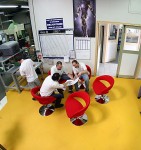There is definitely an “I” in the word “team”
I’ve grown up professionally hearing that “there is no “I” in the word “team””. I always took it to mean that one should set aside’s one’s:
- Narrow self-interest, and rather work for the good of the team
- Ego, and join with team identity
Taken at face value this seems to make sense, but let’s consider it a minute. Think of any sports team. To win, you need first and foremost:
- a clear understanding of what is a “win” and what to work on to achieve one – as in scoring goals
- strong individual players who know their stuff – as in players who have the stamina to run up and down the field and can keep the ball when they have it
- quick follow-up of each other’s initiatives – as in players who know how to pass the ball to each other.
In other words, teamwork is an individual skill: the skill to be able to work well with others across boundaries. Developing teamwork in Lean therefore means:
- Clarifying goals and agreeing on problems (and their impact on each person) before debating solutions, to find flexible answers to specific customer issues
- Training, training, training, so that each member of the team is confident in their area of expertise
- Intense collaboration by following on each other’s ideas quickly and adding to each other’s thinking and initiatives.

In this sense, teamwork is not a property of the “team” but the sum of each individual’s skill at teamwork. Personalities and individualities matter to offer a broader range of perspectives and skills so that each member of the team has 1) a good basic understanding of what matters to other team members, and 2) a strong specific skill set to add to the mix.
To quote Michael Jordan: Maybe there is no “I” in the word “team”, but there is one in the word “win”!









